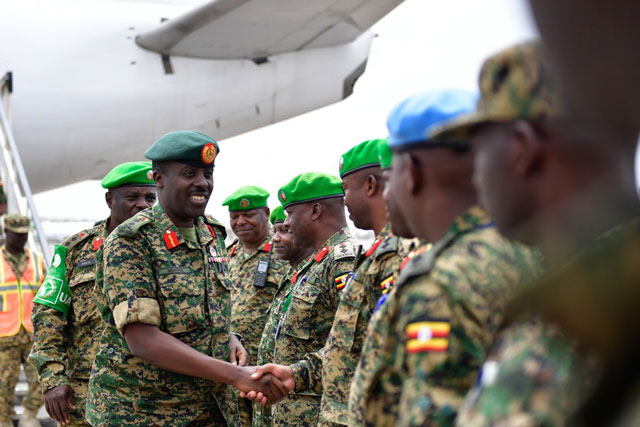
It is now time to allow Al Shabab take over power in Somalia and form a government
THE LAST WORD | Andrew M. Mwenda | It is almost two years since the United States withdrew from Afghanistan with its tail between its legs. This was in spite of spending $2.01 trillion on that country over a period of 20 years. Out of this money, $1.2 trillion was spent on the economic and social development of Afghanistan, a country that remains one of the poorest in the world. The other, $800 billion (yes, $800 billion) was spent on building the Afghan military. It is this expensively trained and equipped army that collapsed in two weeks before a poorly trained and poorly equipped ragtag force of Taliban militias.
Uganda has had troops in Somalia for the last 15 years. In spite of all their fighting to degrade and destroy Al Shabab, this rebel outfit (the Americans and their Ugandans allies would prefer to call it a “terrorist group”) retains control of most of that country. If UPDF and other Amisom troops from Burundi and Kenya were to withdraw today, Al Shabab would enter Mogadishu in less than a week. This is in spite of the EU and the USA having spent years training the army of the Transitional Federal Government of Somalia, equipping them, and paying their salaries.
The lesson for Uganda, the AU and others who believe in the fantasy of nation building is clear. The USA and NATO’s failed adventure in Afghanistan teaches that it is difficult to build a state and mold a nation from outside. States grow organically from within society and reflect many internal negotiations and compromises. For a state to survive and thrive out of external conquest, it requires generations, even centuries to do that. Uganda together with her African and Western allies in their desire to build a stable political order in Somalia are deluded. They have little understanding of the culture, mentalities, aspirations and norms of the Somali people that make it possible to reconfigure the state in that country.
President Yoweri Museveni has never really articulated the main aim of Uganda’s presence in Somalia. And neither has the AU and/or the UN, the two institutions that support and fund this mission. What is our main mission? Is it to reconstruct the Somali state and establish a stable government? Does this require fighting and defeating Al Shabab? And what does defeat of Al Shabab really mean? Does it involve kicking them out of Mogadishu (which we have partially done) or degrade them from the whole of Somalia (which we can never achieve)? How long is this mission expected (or planned) to last? What are the success indicators?
These are the same questions the US and her NATO allies faced in Afghanistan. Their failure to articulate the main aim, clearly define the success indicators and establish an exit strategy led to a protracted and futile occupation of the country. They lost a lot of blood and treasure trying to achieve the impossible. Like the Americans and NATO, Uganda and her Amisom allies have never really defined their main aim or its success indicators and an exit strategy. What we have is a mission without an aim or an end goal. Instead, Amisom troops are propping up a government that lacks legitimacy in the eyes of most Somalis and has little or no capacity to establish a stable government with monopoly over the exercise of violence.
To make matters worse, Amisom is trying to do in Somalia what the US and NATO sought to do in Afghanistan, turn that country into a liberal democracy in one generation. It is difficult to understand why intelligent people can repeat the same thing over and over again and expect to get a different result. Wherever America has meddled with the aim of recreating other societies into its image, it has failed miserably. From Iraq to Libya, from Afghanistan to Liberia, from Syria to Yemen, America’s nation building and democratisation projects abroad had produced one disaster after another, one tragedy after another and one failed state after another.
But the democracy priesthood and their cheer leading human rights mujahedeen insist that this is the right and only path. Thus, in Somalia, a country without even a semblance a state to ensure basic things like law and order, the international “donor” community with its African allies organise elections to elect a president and parliament, finance press freedom projects etc. in the naïve (if not stupid) hope that democracy will deliver a stable government. This way they ignore the lessons of the history of the evolution of stable political orders across geographic time and historic space.
In 2007, Somalia came to the brink of establishing a viable state. The Islamic Courts Union (ICU) organised a serious military campaign. Within a few months it wrestled control of the whole of Somalia from myriad clans that controlled bits of that country. However, the ICU was supported by Eritrea, whose archenemy at the time; Meles Zenawi’s Ethiopia, was scared of. Addis Ababa sent in troops to crush the ICU. It also rallied Washington to support this effort. I followed this keenly because one of the leading players inside the ICU had been a fellow journalist and friend and had kept me informed about the progress they were making.
I was a fellow at Stanford University then and flew from San Francisco to DC to warn then assistant secretary of state for African affairs, Jendayi Frazer, against this move. I explained to her that it is better to work with the ICU to ensure a stable political order than have a power vacuum which Ethiopia’s invasion would recreate. She seemed to agree with my reasoning. However, a few days later I saw on the news that the U.S, air force was supporting Ethiopia’s ground troops in a campaign to crush the ICU. From the ashes of the defeat of the ICU emerged Al Shabab.
Fifteen years later, Al Shabab remains the only well-organised force with capacity to gain effective military control over the whole of Somalia. In a country divided along clan lines, Al Shabab is the only political organisation with a unifying ideology – Islam. This is an important beginning point to reimagine a unified Somalia. America and her NATO allies cannot claim inability to work with an “extremist” Islamic movement. Their closest ally in the Middle East, the Kingdom of Saudi Arabia, is an extremist Islamic state of the Wahabi sect. They have lived and worked with it for decades. Why not imagine working with Al Shabab?
******

amwenda@independent.co.ug
 The Independent Uganda: You get the Truth we Pay the Price
The Independent Uganda: You get the Truth we Pay the Price




1.Both USA and Uganda are involved in war not that they love the game of war but they need to stop nations from exporting “Bad Manners” to others some Islamic extremists love bomb blast because its part of their fun now which nation wants to test such nonsense?When we lose our loved ones it really hurts then some ADF chap kills for fun how sick can we be?and shouldn’t someone say enough?no sober nation will feign ignorance when their neighbor is acting funny.Now who does not know that Congo is a safe heaven and breeding ground for rebel activity?
2.Even Kenya which loves minding her own business and being called a good girl in the international arena had to sober up when attacked by the Al Shaabab.
3.Trade routes need to be secured like the Rea Sea,Mediterranean sea,Indian Ocean,Atlantic ocean,Suez canal
4.We all witnessed how the people of Afghanistan filled their airport just to escape from the Taliban i hope no one believes all that was stage managed.
5.Thousands of Arabs normally apply for visas to USA and Europe if these nations were all that unpopular why would they bother to apply to live there?
6.Just imagine if famous Arabs like;Amaal Clooney,DJ khaled,Akon lived in Afghanistan they would be history now.
6.Flexible Arab nations like UAE,Qatar and Saudi Arabia have tested the benefits of dealing with USA and Europe.
7,Should the World let the sleeping dogs lie?will the world be fair when women in the Arab World are caned coz they wore trousers and were stoned to death because they did not cover their heads?